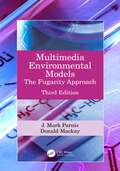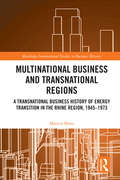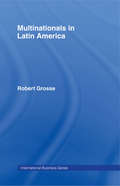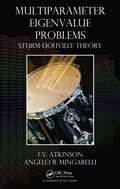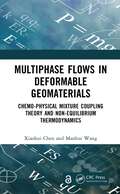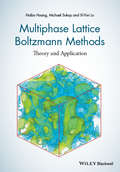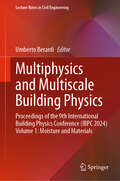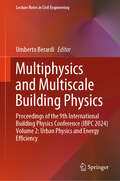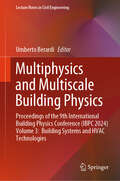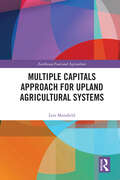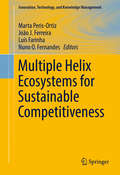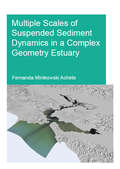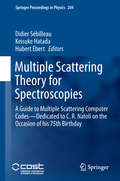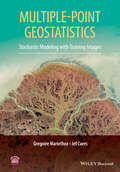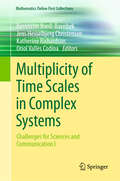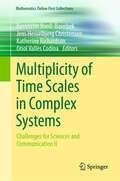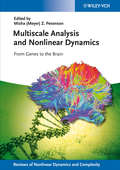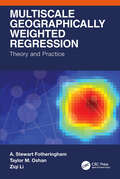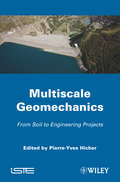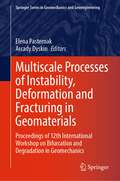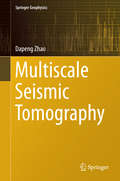- Table View
- List View
Multimedia Environmental Models: The Fugacity Approach
by Donald Mackay J. Mark ParnisMultimedia Environmental Models: The Fugacity Approach, Third Edition, takes a broad approach of viewing chemical behavior in the total biosphere of connected biotic and abiotic compartments. Chemicals are subject to the laws of "mass balance," a constraint that provides the opportunity to establish quantitative expressions for chemical fate that are central to chemical management and regulatory legislation. This book employs both the conventional concentration-based procedures and those based on application of the more elegant and powerful concept of fugacity to characterize equilibrium, steady-state distribution, and time-dependent transport between environmental phases such as air, water, and soil. Organic chemicals are emphasized because they are more easily generalized when assessing environmental behavior.Features Illustrates professional approaches to calculating the fate of chemicals in the environment Explicitly details all worked examples in an annotated step-by-step fashion Presents real-life freely downloadable models of use to government, industry, and private consulting professionals and students alike Clarifies symbols and notation
Multinational Business and Transnational Regions: A Transnational Business History of Energy Transition in the Rhine Region, 1945-1973 (Routledge International Studies in Business History)
by Marten BoonMultinational Enterprise and Transnational Regions offers an innovative approach to the study of the history of transnational economic regions. The Rhine valley is such a region comprising the cities and areas along the Rhine river and its tributaries. The transition from coal to oil that unfolded between 1945 and 1973 rapidly transformed the region, shattering some of the old river-based connections and creating new ones with the introduction of large-scale cross-border oil pipelines. Multinational enterprises shaped these new regional connections but divergent national government responses gave rise to differentiated development in different parts of the Rhine valley. Multinational Enterprise and Transnational Regions argues that processes of regional change should be understood from transnational interconnections rather than from local or national perspectives. This book uses a transnational business history methodology to tease out the region’s transformation and to circumvent the national bias in public sources. It will be of relevance to academics and researchers with an interest in regional and transnational European history, international business, environmental history, and business history, as well as practitioners interested in the oil industry, energy and energy history, business history and international business, and associated disciplines.
Multinationals in Latin America (International Business Series)
by Robert GrosseMultinational enterprises are particularly strong in Latin America and sensitive to political and economic changes there - the currently emerging debt crisis is likely to have far-ranging effects. This book considers multinationals in Latin America, both those from inside and those from outside the region, and discusses the major issues relating to them, e.g. trans-national regulation and the government/business relationships. It sets the discussions against the background of other work and theories of multinational enterprise. Novel features include the development of the author's bargaining theory of multinational enterprise and the attempt to create a systematic method for evaluating MNE acceptability for host governments (an important consideration since the relationship between multinationals and governments, particularly the way a government perceives a multinational, is crucial). The book concludes by assessing current trends and likely future developments.
Multiobjective Shape Design in Electricity and Magnetism
by Paolo Di BarbaMultiobjective Shape Design in Electricity and Magnetism is entirely focused on electric and magnetic field synthesis, with special emphasis on the optimal shape design of devices when conflicting objectives are to be fulfilled. Direct problems are solved by means of finite-element analysis, while evolutionary computing is used to solve multiobjective inverse problems. This approach, which is original, is coherently developed throughout the whole manuscript. The use of game theory, dynamic optimisation, and Bayesian imaging strengthens the originality of the book. Covering the development of multiobjective optimisation in the past ten years, Multiobjective Shape Design in Electricity and Magnetism is a concise, comprehensive and up-to-date introduction to this research field, which is growing in the community of electricity and magnetism. Theoretical issues are illustrated by practical examples. In particular, a test problem is solved by different methods so that, by comparison of results, advantages and limitations of the various methods are made clear.
Multiparameter Eigenvalue Problems: Sturm-Liouville Theory
by F.V. Atkinson Angelo B. MingarelliOne of the masters in the differential equations community, the late F.V. Atkinson contributed seminal research to multiparameter spectral theory and Sturm-Liouville theory. His ideas and techniques have long inspired researchers and continue to stimulate discussion. With the help of co-author Angelo B. Mingarelli, Multiparameter Eigenvalue Problem
Multiphase Flows in Deformable Geomaterials: Chemo-Physical Mixture Coupling Theory and Non-Equilibrium Thermodynamics
by Xiaohui Chen Manhui WangMultiphase Flows in Deformable Geomaterials proposes that multiscale coupling of multiphase flow and multicomponents within a deformable porous medium is complex and interdisciplinary and lacks a unified theory. To address this gap, the book proposes chemo-physical Mixture-Coupling Theory and non-equilibrium thermodynamic processes to derive governing equations for multiphase transport and mechanical behavior. This addresses challenges in the existing multiscale coupling theory and brings together physics and chemistry within the realm of thermodynamics. The series of constitutive equations can be applied to any constitutive model in porous media, across many disciplines related to soils, concrete, and catalysis.This book is particularly addressed to geotechnical and geoenvironmental engineering—bringing together multiphase flows of water and gas, chemicals, and within soils and rocks. Highlights include hydro‑mechanical coupling, unsaturated hydro‑mechanical‑chemical coupling, thermo‑hydro‑mechanical coupling, and thermo‑hydromechanical‑chemical coupling, with consideration of chemo and thermo osmosis and microscopic swelling mechanisms. It is written for advanced students and researchers.The Open Access version of this book, available at http://www.routledge.com/9780367343064, has been made available under a Creative Commons [Attribution (CC BY)] 4.0 license.
Multiphase Lattice Boltzmann Methods: Theory and Application
by Haibo Huang Michael Sukop Xiyun LuTheory and Application of Multiphase Lattice Boltzmann Methods presents a comprehensive review of all popular multiphase Lattice Boltzmann Methods developed thus far and is aimed at researchers and practitioners within relevant Earth Science disciplines as well as Petroleum, Chemical, Mechanical and Geological Engineering. Clearly structured throughout, this book will be an invaluable reference on the current state of all popular multiphase Lattice Boltzmann Methods (LBMs). The advantages and disadvantages of each model are presented in an accessible manner to enable the reader to choose the model most suitable for the problems they are interested in. The book is targeted at graduate students and researchers who plan to investigate multiphase flows using LBMs. Throughout the text most of the popular multiphase LBMs are analyzed both theoretically and through numerical simulation. The authors present many of the mathematical derivations of the models in greater detail than is currently found in the existing literature. The approach to understanding and classifying the various models is principally based on simulation compared against analytical and observational results and discovery of undesirable terms in the derived macroscopic equations and sometimes their correction. A repository of FORTRAN codes for multiphase LBM models is also provided.
Multiphysics and Multiscale Building Physics: Proceedings of the 9th International Building Physics Conference (IBPC 2024) Volume 1: Moisture and Materials (Lecture Notes in Civil Engineering #552)
by Umberto BerardiThis book contains selected papers presented at the 9th edition of the official triennial conference of the International Association of Building Physics (IABP), held in Toronto, Ontario, Canada on 25-27 July, 2024. The contents make valuable contributions to academic researchers and practioners of the building sector. Readers will encounter new ideas for realizing more efficient and resilient buildings and cities. The approach followed in the book aims to explore how building physics can be explored using multi domains and scales.
Multiphysics and Multiscale Building Physics: Proceedings of the 9th International Building Physics Conference (IBPC 2024) Volume 2: Urban Physics and Energy Efficiency (Lecture Notes in Civil Engineering #553)
by Umberto BerardiThis book contains selected papers presented at the 9th edition of the official triennial conference of the International Association of Building Physics (IABP), held in Toronto, Ontario, Canada on 25-27 July, 2024. The contents make valuable contributions to academic researchers and practioners of the building sector. Readers will encounter new ideas for realizing more efficient and resilient buildings and cities. The approach followed in the book aims to explore how building physics can be explored using multi domains and scales.
Multiphysics and Multiscale Building Physics: Proceedings of the 9th International Building Physics Conference (IBPC 2024) Volume 3: Building Systems and HVAC Technologies (Lecture Notes in Civil Engineering #554)
by Umberto BerardiThis book contains selected papers presented at the 9th edition of the official triennial conference of the International Association of Building Physics (IABP), held in Toronto, Ontario, Canada on 25-27 July, 2024. The contents make valuable contributions to academic researchers and practioners of the building sector. Readers will encounter new ideas for realizing more efficient and resilient buildings and cities. The approach followed in the book aims to explore how building physics can be explored using multi domains and scales.
Multiphysics and Multiscale Building Physics: Proceedings of the 9th International Building Physics Conference (IBPC 2024) Volume 4: Indoor Air Quality (IAQ), Lighting and Acoustics (Lecture Notes in Civil Engineering #555)
by Umberto BerardiThis book contains selected papers presented at the 9th edition of the official triennial conference of the International Association of Building Physics (IABP), held in Toronto, Ontario, Canada on 25-27 July, 2024. The contents make valuable contributions to academic researchers and practioners of the building sector. Readers will encounter new ideas for realizing more efficient and resilient buildings and cities. The approach followed in the book aims to explore how building physics can be explored using multi domains and scales.
Multiple Capitals Approach for Upland Agricultural Systems (Earthscan Food and Agriculture)
by Lois MansfieldThis book focuses on upland agricultural systems and applies a multiple capitals approach to explain what they can provide at a time when many are struggling to survive.Marginal upland agricultural systems have been distorted and derailed by modern economics, politics, and the drive to intensification. This book argues for the application of a multiple capitals approach to resource management challenges for marginal upland agricultural communities. Instead of considering what upland agricultural systems lack, the book showcases how a multiple capitals framework can demonstrate the importance, interrelationships, and relevance of the suite of capitals (natural, human, social, cultural, and financial) to achieve better outcomes for upland communities, broader ecosystem services, and wider society more generally. It is designed to connect theory to practice to provide underpinning knowledge and guidance to help upland agricultural communities thrive. Drawing on case studies from the UK and Japan, as well as making comparisons with Central and South American countries, the book recommends tools for monitoring different forms of capital and suggests a management process driven by multiple capitals to create resilience in upland agricultural systems.This book will be of great interest to students and scholars of agriculture, natural resource management, ecosystem services, rural development, and those interested in applying a multiple capitals approach more widely within policy and landscape management contexts.
Multiple Dirichlet Series, L-functions and Automorphic Forms
by Daniel Bump Solomon Friedberg Dorian GoldfeldMultiple Dirichlet Series, L-functions and Automorphic Forms gives the latest advances in the rapidly developing subject of Multiple Dirichlet Series, an area with origins in the theory of automorphic forms that exhibits surprising and deep connections to crystal graphs and mathematical physics. As such, it represents a new way in which areas including number theory, combinatorics, statistical mechanics, and quantum groups are seen to fit together. The volume also includes papers on automorphic forms and L-functions and related number-theoretic topics. This volume will be a valuable resource for graduate students and researchers in number theory, combinatorics, representation theory, mathematical physics, and special functions. Contributors: J. Beineke, B. Brubaker, D. Bump, G. Chinta, G. Cornelissen, C.A. Diaconu, S. Frechette, S. Friedberg, P. Garrett, D. Goldfeld, P.E. Gunnells, B. Heim, J. Hundley, D. Ivanov, Y. Komori, A.V. Kontorovich, O. Lorscheid, K. Matsumoto, P.J. McNamara, S.J. Patterson, M. Suzuki, H. Tsumura.
Multiple Helix Ecosystems for Sustainable Competitiveness
by Marta Peris-Ortiz João J. Ferreira Luís Farinha Nuno O. FernandesThis book discusses the main issues, challenges, opportunities, andtrends involving the interactions between academia, industry, government and society. Specifically, it aims to explore how these interactions enhance the ways inwhich companies deliver products and services in order to achieve sustainablecompetitiveness in the marketplace. Sustainable competitiveness has been widely discussed by academics andpractitioners, considering the importance of protecting the environment whilesustaining the economic goals of organizations. The Quintuple Helix innovation modelis a framework for facilitating knowledge, innovation and sustainablecompetitive advantage. It embeds the Triple and the Quadruple Helix models byadding a fifth helix, the "natural environment. " The Triple Helix model focuseson the university-industry-government triad, while the Quadruple adds civilsociety (the media- and culture-driven public) as a fourth helix. The Quintuple Helix model facilitates research, public policy, andpractical application of sustainable competitiveness principles. Applying themost recent developments and theoretical insights of this model, thecontributors to this volume address such questions as: how do government,academia, industry and civil society actors interact for promoting sustainablecompetitiveness at the country (regional) level? How do these actors influencesustainable operations management at the company (business) level? In so doing,they shed new light on the dynamics of economic growth, sustainability andcompetitiveness.
Multiple Scales of Suspended Sediment Dynamics in a Complex Geometry Estuary (IHE Delft PhD Thesis Series)
by Fernanda Minikowski AcheteMany estuaries are located in urbanized, highly engineered environments. Cohesive sediment plays an important role due to its link with estuarine health and ecology. An important ecological parameter is the suspended sediment concentration (SSC) translated into turbidity levels and sediment budget. This study contributes to investigate and forecast turbidity levels and sediment budget variability at San Francisco Bay-Delta system at a variety of spatial and temporal scales applying a flexible mesh process-based model (Delft3D FM). It is possible to have a robust sediment model, which reproduces 90% of the yearly data derived sediment budget, with simple model settings, like applying one mud fraction and a simple bottom sediment distribution. This finding opens the horizon for modeling less monitored estuaries.Comparing two case studies, i.e. the Sacramento-San Joaquin Delta and Alviso Slough, a classification for estuaries regarding the main sediment dynamic forcing is proposed: event-driven estuary (Delta) and tide-driven estuary (Alviso Slough). In the event-driven estuaries, the rivers are the main sediment source and the tides have minor impact in the net sediment transport. In the tide-driven estuaries, the main sediment source is the bottom sediment and the tide asymmetry defines the net sediment transport.This research also makes advances in connecting different scientific fields and developing a managerial tool to support decision making. It provides the basis to a chain of models, which goes from the hydrodynamics, to suspended sediment, to phytoplankton, to fish, clams and marshes.
Multiple Scattering Theory for Spectroscopies: A Guide To Multiple Scattering Computer Codes -- Dedicated To C. R. Natoli On The Occasion Of His 75th Birthday (Springer Proceedings In Physics #204)
by Didier Sébilleau Keisuke Hatada Hubert EbertThis edited book, based on material presented at the EU Spec Training School on Multiple Scattering Codes and the following MSNano Conference, is divided into two distinct parts. The first part, subtitled “basic knowledge”, provides the basics of the multiple scattering description in spectroscopies, enabling readers to understand the physics behind the various multiple scattering codes available for modelling spectroscopies. The second part, “extended knowledge”, presents “state- of-the-art” short chapters on specific subjects associated with improving of the actual description of spectroscopies within the multiple scattering formalism, such as inelastic processes, or precise examples of modelling.
Multiple-point Geostatistics: Stochastic Modeling with Training Images
by Jef Caers Professor Gregoire MariethozThis book provides a comprehensive introduction to multiple-point geostatistics, where spatial continuity is described using training images. Multiple-point geostatistics aims at bridging the gap between physical modelling/realism and spatio-temporal stochastic modelling. The book provides an overview of this new field in three parts. Part I presents a conceptual comparison between traditional random function theory and stochastic modelling based on training images, where random function theory is not always used. Part II covers in detail various algorithms and methodologies starting from basic building blocks in statistical science and computer science. Concepts such as non-stationary and multi-variate modeling, consistency between data and model, the construction of training images and inverse modelling are treated. Part III covers three example application areas, namely, reservoir modelling, mineral resources modelling and climate model downscaling. This book will be an invaluable reference for students, researchers and practitioners of all areas of the Earth Sciences where forecasting based on spatio-temporal data is performed.
Multiplicity of Time Scales in Complex Systems: Challenges for Sciences and Communication I (Mathematics Online First Collections)
by Bernhelm Booß-Bavnbek Katherine Richardson Jens Hesselbjerg Christensen Oriol Vallès CodinaThis highly interdisciplinary volume brings together a carefully curated set of case studies examining complex systems with multiple time scales (MTS) across a variety of fields: materials science, epidemiology, cell physiology, mathematics, climatology, energy transition planning, ecology, economics, sociology, history, and cultural studies. The book addresses the vast diversity of interacting processes underlying the behaviour of different complex systems, highlighting the multiplicity of characteristic time scales that are a common feature of many and showcases a rich variety of methodologies across disciplinary boundaries. Self-organizing, out-of-equilibrium, ever-evolving systems are ubiquitous in the natural and social world. Examples include the climate, ecosystems, living cells, epidemics, the human brain, and many socio-economic systems across history. Their dynamical behaviour poses great challenges in the pressing context of the climate crisis, since they may involve nonlinearities, feedback loops, and the emergence of spatial-temporal patterns, portrayed by resilience or instability, plasticity or rigidity; bifurcations, thresholds and tipping points; burst-in excitation or slow relaxation, and worlds of other asymptotic behaviour, hysteresis, and resistance to change. Chapters can be read individually by the reader with special interest in such behaviours of particular complex systems or in specific disciplinary perspectives. Read together, however, the case studies, opinion pieces, and meta-studies on MTS systems presented and analysed here combine to give the reader insights that are more than the sum of the book’s individual chapters, as surprising similarities become apparent in seemingly disparate and unconnected systems. MTS systems call into question naïve perceptions of time and complexity, moving beyond conventional ways of description, analysis, understanding, modelling, numerical prediction, and prescription of the worldaround us. This edited collection presents new ways of forecasting, introduces new means of control, and – perhaps as the most demanding task – it singles out a sustainable description of an MTS system under observation, offering a more nuanced interpretation of the floods of quantitative data and images made available by high- and low-frequency measurement tools in our unprecedented era of information flows.
Multiplicity of Time Scales in Complex Systems: Challenges for Sciences and Communication II (Mathematics Online First Collections)
by Bernhelm Booß-Bavnbek Katherine Richardson Jens Hesselbjerg Christensen Oriol Vallès CodinaNote to the interested reader to have a look at the companion to this volume Challenges for Sciences and Communication I | ISBN: 978-3-031-28048-1.This highly interdisciplinary volume brings together a carefully curated set of case studies examining complex systems with multiple time scales (MTS) across a variety of fields: materials science, epidemiology, cell physiology, mathematics, climatology, energy transition planning, ecology, economics, sociology, history, and cultural studies. The book addresses the vast diversity of interacting processes underlying the behaviour of different complex systems, highlighting the multiplicity of characteristic time scales that are a common feature of many and showcases a rich variety of methodologies across disciplinary boundaries. Self-organizing, out-of-equilibrium, ever-evolving systems are ubiquitous in the natural and social world. Examples include the climate, ecosystems, living cells, epidemics, the human brain, and many socio-economic systems across history. Their dynamical behaviour poses great challenges in the pressing context of the climate crisis, since they may involve nonlinearities, feedback loops, and the emergence of spatial-temporal patterns, portrayed by resilience or instability, plasticity or rigidity; bifurcations, thresholds and tipping points; burst-in excitation or slow relaxation, and worlds of other asymptotic behaviour, hysteresis, and resistance to change. Chapters can be read individually by the reader with special interest in such behaviours of particular complex systems or in specific disciplinary perspectives. Read together, however, the case studies, opinion pieces, and meta-studies on MTS systems presented and analysed here combine to give the reader insights that are more than the sum of the book’s individual chapters, as surprising similarities become apparent in seemingly disparate and unconnected systems. MTS systems call into question naïve perceptionsof time and complexity, moving beyond conventional ways of description, analysis, understanding, modelling, numerical prediction, and prescription of the world around us. This edited collection presents new ways of forecasting, introduces new means of control, and – perhaps as the most demanding task – it singles out a sustainable description of an MTS system under observation, offering a more nuanced interpretation of the floods of quantitative data and images made available by high- and low-frequency measurement tools in our unprecedented era of information flows.
Multiscale Analysis and Nonlinear Dynamics
by Heinz Georg Schuster Misha Meyer PesensonSince modeling multiscale phenomena in systems biology and neuroscience is a highly interdisciplinarytask, the editor of the book invited experts in bio-engineering, chemistry, cardiology, neuroscience,computer science, and applied mathematics, to provide their perspectives. Each chapter is a window into the current state of the art in the areas of research discussed and the book is intended for advanced researchers interested in recent developments in these fields. While multiscaleanalysis is the major integrating theme of the book, its subtitle does not call for bridging thescales from genes to behavior, but rather stresses the unifying perspective offered by the conceptsreferred to in the title. It is believed that the interdisciplinary approach adopted here will be beneficial for all the above mentioned fields.
Multiscale Analysis of Viscous Flows in Thin Tube Structures (Advances in Mathematical Fluid Mechanics)
by Konstantin Pileckas Grigory PanasenkoThis book presents the analysis of viscous flows in thin tube structures, and develops a multi-scale method for modeling blood flow. For the reader’s convenience, the authors introduce all necessary notions and theorems from functional analysis and the classical theory of the Navier-Stokes equations. The problems of all asymptotic methods used in the book are explained as well, such as the dimension reduction and the boundary layer method. Through several numerical experiments, readers will discover that the proposed methods are more flexible than the theoretically predicted conditions. Multiscale Analysis of Viscous Flows in Thin Tube Structures will be a valuable resource for a wide range of readers, including applied mathematicians, specialists in bio-engineering, and biophysicists.
Multiscale Geographically Weighted Regression: Theory and Practice
by A. Stewart Fotheringham Taylor M. Oshan Ziqi Li· Provides a balance between conceptual and technical introduction to local models · Explains state-of-the-art spatial analysis technique for multiscale regression modeling · Describes best practices and provides a detailed walkthrough of freely available software, through examples and comparisons with other common spatial data modeling techniques · Includes a detailed case study to demonstrate methods and software · Takes a new and exciting angle on local spatial modeling using MGWR, an innovation to the previous local modeling ‘bible’ GWR
Multiscale Geomechanics: From Soil to Engineering Projects (Wiley-iste Ser.)
by Pierre-Yves HicherThis book addresses the latest issues in multiscale geomechanics. Written by leading experts in the field as a tribute to Jean Biarez (1927-2006), it can be of great use and interest to researchers and engineers alike. A brief introduction describes how a major school of soil mechanics came into being through the exemplary teaching by one man. Biarez's life-long work consisted of explaining the elementary mechanisms governing soil constituents in order to enhance understanding of the underlying scientific laws which control the behavior of constructible sites and to incorporate these scientific advancements into engineering practices. He innovated a multiscale approach of passing from the discontinuous medium formed by individual grains to an equivalent continuous medium. The first part of the book examines the behavior of soils at the level of their different constituents and at the level of their interaction. Behavior is then treated at the scale of the soil sample. The second part deals with soil mechanics from the vantage point of the construction project. It highlights Biarez's insightful adoption of the Finite Element Codes and illustrates, through numerous construction examples, his methodology and approach based on the general framework he constructed for soil behavior, constantly enriched by comparing in situ measurements with calculated responses of geostructures.
Multiscale Processes of Instability, Deformation and Fracturing in Geomaterials: Proceedings of 12th International Workshop on Bifurcation and Degradation in Geomechanics (Springer Series in Geomechanics and Geoengineering)
by Elena Pasternak Arcady Dyskin· Proceedings of 12th International Workshop on Bifurcation and Degradation in Geomechanics (IWBDG2022) held on 28 November - 1 December 2022 at the University of Western Australia, in Perth, Australia. The book concentrates on deep understanding of the processes of bifurcation and instability in geoengineering systems. The book covers multiscale processes from the scale of crystals to rocks to rock masses. The book considers a wide range of accompanying phenomena from liquefaction to seismicity and landslides. · Topics covered are: I. Localisation and instability in geomaterials II. Fracturing, failure and seismicity III. Deformation processes Intended readership: Universities and Consulting and Research organisations, research students, academics and engineers working in the fields of geomechanics, rock mechanics and geotechnical engineering.
Multiscale Seismic Tomography
by Dapeng ZhaoThis book on multiscale seismic tomography, written by one of the leaders in the field, is suitable for undergraduate and graduate students, researchers, and professionals in Earth and planetary sciences who need to broaden their horizons about seismotectonics, volcanism, and interior structure and dynamics of the Earth and Moon. It describes the state-of-the-art in seismic tomography, with emphasis on the new findings obtained by applying tomographic methods in local, regional, and global scales for understanding the generating mechanism of large and great earthquakes such as the 2011 Tohoku-oki earthquake (Mw 9. 0), crustal and upper mantle structure, origin of active arc volcanoes and intraplate volcanoes including hotspots, heterogeneous structure of subduction zones, fate of subducting slabs, origin of mantle plumes, mantle convection, and deep Earth dynamics. The first lunar tomography and its implications for the mechanism of deep moonquakes and lunar evolution are also introduced.
